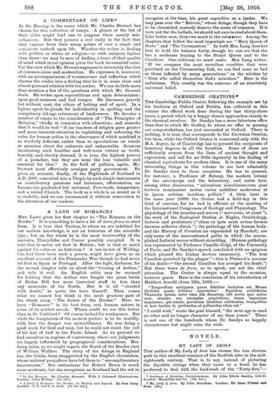CAMBRIDGE ORATION S.* THE Cambridge Public Orator, following the example
set by his brethren at Oxford and Dublin, has collected in this volume the official work done during the last thirty-three years, a period which by a happy chance approaches closely to
the classical met/214m. Dr. Sandys has a more laborious office than that to which Mr. Godley, to whom we offer in passing
our congratulations, has just succeeded at Oxford. There is nothing, it is true, that corresponds to the Creweian Oration, but then, while the Oxford Orator is concerned only with the M.A. degree, he of Cambridge has to present the recipients of
honorary degrees in all the faculties. Some of these are sufficiently remote from the lines of ancient thought and expression, and call for no little ingenuity in the finding of classical equivalents for modern ideas. It is one of the many interesting things in this volume to see how admirably Dr. Sandys rises to these occasions. He has to present, for instance, a Professor of Botany, the modern botany of the microscope and the laboratory, and notes how, among other discoveries, " animalium minutissimorum quae bacteria nominantur motes varios subtiliter moderatur et in ipsum exitium insidiose pellicit." A little later in the same year (1898) the Orator had a field-day in this kind of exercise, for he had to officiate at the meeting of the International Congresses of Zoology and Physiology. The physiology of the muscles and nerves (" nervorum, ut aiunt "), the work of the Zoological Station at Naples, Ornithology, historic and prehistoric (" etiam ex ipsis saris avium formal latentes sollerter elicuit "), the pathology of the human body, and the History of Creation (as expounded by Haeckel), are only some of the unaccustomed paths in which the accom- plished Latinist moves without stumbling. (Human pathology was represented by Professor Camillo Golgi, of the University of Pavia, and Dr. Sandys's speech concluded with an epigram which pleased the Italian doctors immensely. " The first Camillus perished by the plague "—this is Plutarch's account of his death—" the second Camillus has avenged his death.") But these tours de force, so to speak, are not the chief attraction. The Orator is always equal to the occasion, however grave. Here is the conclusion of his introduction of Matthew Arnold (June 13th, 1883) :—
"Tragoedia.m antiquam quam fideliter imitatus est, Mums Sicilides quam feliciter aemulatus! Equidem crediderim Thamesin ipsum, inter rura illa fluentem, ubi poets ipse flatus erat, alumno suo exemplar praetulisse, mum ingenium inspirasse ; qui amnis, poetarum landibus celebrates, tranquillus at non tardus it, profnndus at pellucidus idem est."
"I could wish," wrote the poet himself, "the next age to read no other and no longer character of me than yours." There is not one of the hundreds whom Dr. Sandys so happily characterises but might echo the wish.














































 Previous page
Previous page